
Impact Update
Third Quarter 2022
Coming together on climate action.
Creating change can be a gradual process. We understand this, especially as impact investors—since our work requires persistence and patience. But, in time, diligence is rewarded with bursts of momentum.
Progress on climate, for example, is picking up speed. Climate Week 2022 recently brought together leaders and experts from around the world. The Inflation Reduction Act—passed by U.S. Congress over the summer—represents an unprecedented surge of climate action that will help rally the global community. These events are cause for optimism and are giving us further clarity on how investors, companies, and communities can work together to drive progress.
We have valuable momentum right now. This update spotlights how our investments and engagements are helping seize this momentum—on climate change, biodiversity, labor rights, affordable housing, and more.
In this edition
Engagement Overview
Domini meets with company executives on its own and in collaboration with other investors to encourage stronger policies and practices on the issues that matter to us. Aligned with our standards, we seek improved disclosure, more responsible practices, and address emerging issues with our companies. Through this constructive interaction – via letters, dialogues, shareholder proposals, and proxy votes – Domini communicates its expectations to companies and encourages innovation and business models that uphold respect for human rights while contributing to ecological sustainability and resilience.
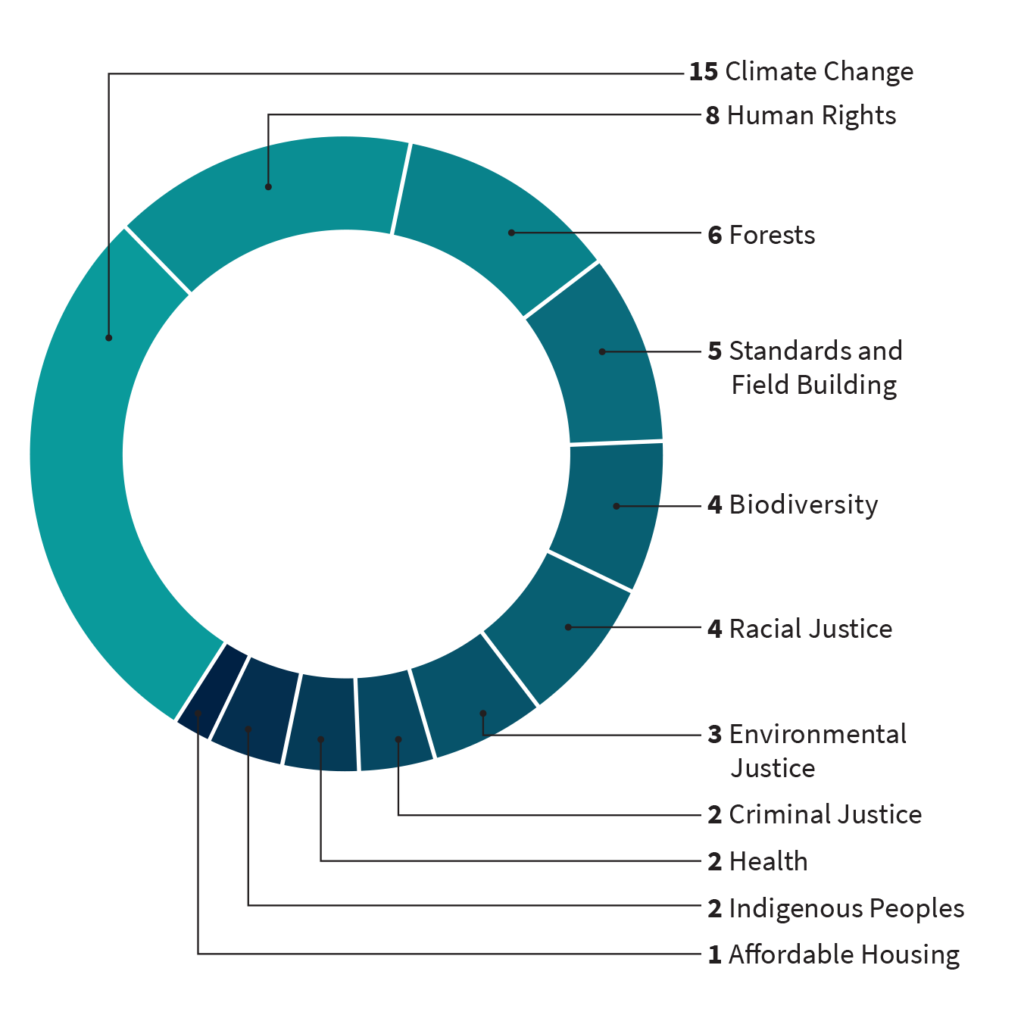
The UN Sustainable Goals (SDGs)
In the seven years since United Nations member states adopted the 2030 Agenda for Sustainable Development, the Sustainable Development Goals (SDGs) have been widely embraced by governments, civil society organizations, companies, and investors. The SDGs aim to address broad global topics such as poverty eradication, food security, protection of forests, sustainable cities and economic growth, gender equality, and climate change.
In each impact update, we’ll feature a few of our engagements alongside an investment highlight and show you which SDGs these are aligned with.
Biodiversity, Forests, and the Path to Net-Zero
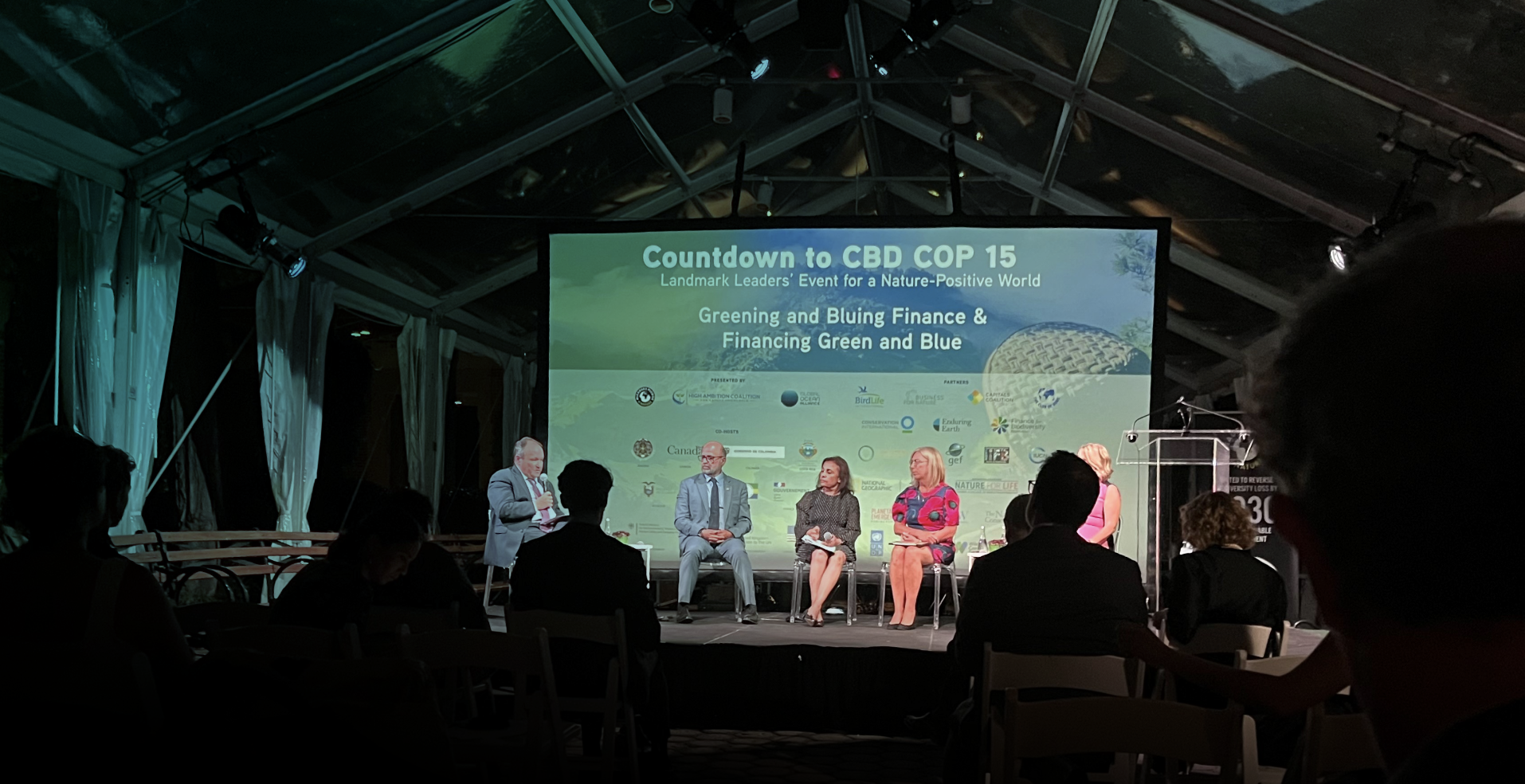

Different strategies are needed to address climate change—from reducing the emissions caused by energy use to making sure we protect resources, like forests, that will help us offset emissions. As global leaders gathered in New York for the UN General Assembly during Climate Week, we were pleased to participate. Our CEO, Carole Laible, spoke at a UN General Assembly side-event on biodiversity alongside heads of state, Indigenous leaders, and experts in advance of UN Biodiversity COP 15, which takes place in Montreal this December. Representing the Finance for Biodiversity Pledge, Laible encouraged the adoption of a strong global biodiversity framework and emphasized the important role of the financial sector. It is essential that we end the financing of activities that harm biodiversity, and increase financing for nature-positive activity with support from public and private sector actors.
Our Director of Engagement, Mary Beth Gallagher, spoke about our work on deforestation before different audiences—strengthening partnerships and collaborations with civil society partners, Indigenous leaders, and investors, among other stakeholders. We shared about our efforts already underway to implement the commitment to address deforestation in our portfolios by 2025. We are focused on assessing how companies in our funds may be at risk, and are encouraging companies to commit to and work toward ending tropical deforestation related to paper, soy, palm oil, and cattle. We also urge the adoption of best practices and emerging nature-based solutions that can reduce our dependence on agriculture responsible for deforestation and land conversion. We recognize this as an important part of the pathway to net-zero emissions.
Addressing Uyghur Human Rights in the Cotton Supply Chain


In the apparel and retail industries, the cotton supply chain has been a source of increasing human rights risks and has drawn enhanced regulatory scrutiny. The U.S. Uyghur Forced Labor Prevention Act went into effect in June, and companies are now under further pressure to demonstrate that their human rights policies and programs are working. The UN High Commissioner for Human Rights issued a report on the situation in the Uyghur region in China, confirming the serious human rights violations— including detention, torture, religious persecution, and family separation—that are impacting over one million Uyghur ethnic minorities.
We engaged with Hennes & Mauritz (H&M) and adidas to better understand how they implement their human rights commitments in this complex supply chain and geopolitical context. Given how severe and widespread the alleged abuses are in the Chinese cotton sector, we filed a proposal with Nike urging the company to stop sourcing and manufacturing cotton from China until the human rights situation improves. The proposal sparked important conversations among investors and within the company.
Freedom of Association


Unions play an important role in helping workers collectively advocate for their fundamental rights and secure better working conditions, wages, benefits, and training. They also offer benefits to companies, supporting better communication channels with workers and lowering turnover. At Domini, we favor unions. They are gaining increasing support among workers and others, with recent polling showing that 71% of Americans approve of labor unions.1
We co-filed a proposal asking that Tesla adopt a policy on freedom of association and collective bargaining. The proposal received support from 32% of investors. While Tesla is a leader on climate change, it faces criticism around workforce practices, including anti-union tactics, racial discrimination lawsuits, and poor working conditions in China. Implementing clear policies would help Tesla treat employees fairly and create a positive productive work environment.
1 https://news.gallup.com/poll/398303/approval-labor-unions-highest-point-1965.aspx
Working with Bloomberg to
Improve DEI Data

Domini conducts all its research in house without purchasing any third-party ESG research. One of the tools used by our team is the Bloomberg Terminal, which aggregates data from companies and makes it easily accessible. Unfortunately, data on diversity, equity, and inclusion is not as readily available or standardized as other data points. Domini is in a dialogue with Bloomberg, discussing what DEI data would enhance our research process.

Bond Fund: Access to Equitable and Affordable Housing
We met with Fannie Mae Single-Family Business to provide input on its new proposed Social Index Methodology, which seeks to provide increased disclosure to investors about the mortgages underlying an asset-backed security, while protecting the privacy of individual borrowers. This framework will give more data to investors who are seeking to invest in affordable housing, communities that have historically been excluded, or further other social goals. For example, the index includes information about the income of the borrower, or if they are a minority or first-time homebuyer. It also indicates generally where a property is located, so an investor knows whether they are investing in housing in a low-income, rural, minority neighborhood, or a mobile home, which is generally more affordable.
Our engagement supported the goals of the index. We worked to better understand how Fannie Mae may use the information, and if it has the potential to have a positive impact for borrowers. We offered some recommendations and encouraged the development of strategies to address structural issues, such as historical home ownership disparities by race or the risks of displacement and gentrification.
Domini Impact Bond Fund Theme Allocations2


Access to Housing
Supports affordable mortgage credit & rental properties, multifamily collateralized mortgage obligations, and other residential mortgage backed securities.

Corporate Debt
Supports corporate general obligations & bank loans of companies that meet Domini’s Impact Investment Standards.

Non-Housing Asset-Backed Securities
Supports commercial mortgage-backed securities, auto loans, and other asset backed securities that meet Domini’s Impact Investment Standards.

Economic & Community Development
Supports nonprofit education, rural & agricultural communities, creative economy & public interest, transportation, access to water, business & job creation, and community development financial institutions.

Health, Well-Being & Aging Society
Supports nonprofit healthcare and research facilities, housing and healthcare services, and pensions.

Low-Carbon Transition
Supports renewable energy, energy efficiency and green buildings, sustainable cities, sustainable forestry and conservation, and corporate green and sustainability bonds.
2 Based on portfolio holdings as of 9/30/2022, excluding cash & cash equivalents, cash offsets, futures, swaps and options with the exception of short-term U.S. Agency bonds and Certificates of Deposit, which are reflected in this reporting. Numbers may not sum to totals due to rounding. The composition of the Fund’s portfolio is subject to change. Visit domini.com to view the most current list of the Fund’s holdings.
3 “Corporate Debt” includes general-obligation corporate bonds, bank loans, and corporate debt not classified under other themes.

Investment Highlight: Domini Impact Bond Fund
Federal Farm Credit Banks Funding Corporation provides a source of capital to rural communities and businesses, as well as to the infrastructure providers that supply clean water, reliable energy, and internet access. It is currently a lender to more than 600,000 customers, supporting over 40% of all U.S. farm business debt.
A Transformational Climate Transition
Excerpted from our 2022 Annual Report essay
On August 16, President Biden signed the Inflation Reduction Act into law. The surprise deal, which came after a year debate, represents a level of climate action that has eluded U.S. policy makers for decades and sends a signal to the global community that the U.S. is on board. The law is complex and our work is just beginning—but it is bold action and an unmistakable step in the right direction.
Capitol Hill, of course, isn’t the only place where climate action takes place. It can’t be. Years of Congressional gridlock has meant that communities, companies, and their investors have become key drivers of climate action. The Inflation Reduction Act has created a new sense of momentum and optimism for everyone working on the climate crisis. As we embark on this crucial opportunity to restructure our economy, we cannot afford to replicate the problems of the past. We need an ambitious, substantive climate response that puts equity at its very center. There’s no time for delay. Companies are already sharing announcements of initiatives, partnerships, and facilities that are enhanced by the new legislation. They are building solutions that our investments can help bring to scale.
At Domini, climate change has long been central to our investment approach. We can help create a better future through our choices, and so can each individual.
“We need an ambitious, substantive climate response that puts equity at its very center.”
What We Look At
Our core goals are universal human dignity and ecological sustainability. They’ve shaped how we analyze, invest in, and seek to influence companies since day one. There are certain lines of business that we believe are fundamentally misaligned with our goals. Our response? We don’t invest in them, plain and simple.
Excluding fossil fuels is an essential first step in building portfolios geared for a more sustainable economy. But most research questions aren’t so cut-and-dry. Whether a company is contributing towards a greener future often depends on their business model, their climate transition plans, and their efforts to center the needs of their communities, customers, and other stakeholders.
For more on our excluded industries, visit domini.com/exclusions
Effectively analyzing those points means getting down to the details—so we’ve evolved our Impact Investment Standards accordingly. We go beyond the assessment of greenhouse gas emissions reductions. We look for evidence that companies are aiming to lower their climate impact by focusing capital expenditure on energy efficiency, renewable energy, recycling and circular economy initiatives, and a just transition. These plans should incorporate thorough assessments of risks and opportunities across their markets and industries, and recognize the intersection between environmental issues and social justice in the low-carbon transition.
Thinking Big, Working Collaboratively
As impact investors, our main focus is identifying companies that are helping create a more sustainable future. But our scope isn’t limited just to corporate climate action. We know that companies’ climate work intersects with local environmental justice challenges, federal climate policy, and much more.
Learn more about what assessment tools we use, how we engage companies, and our climate action partnerships at domini.com/climatetransition
Domini News
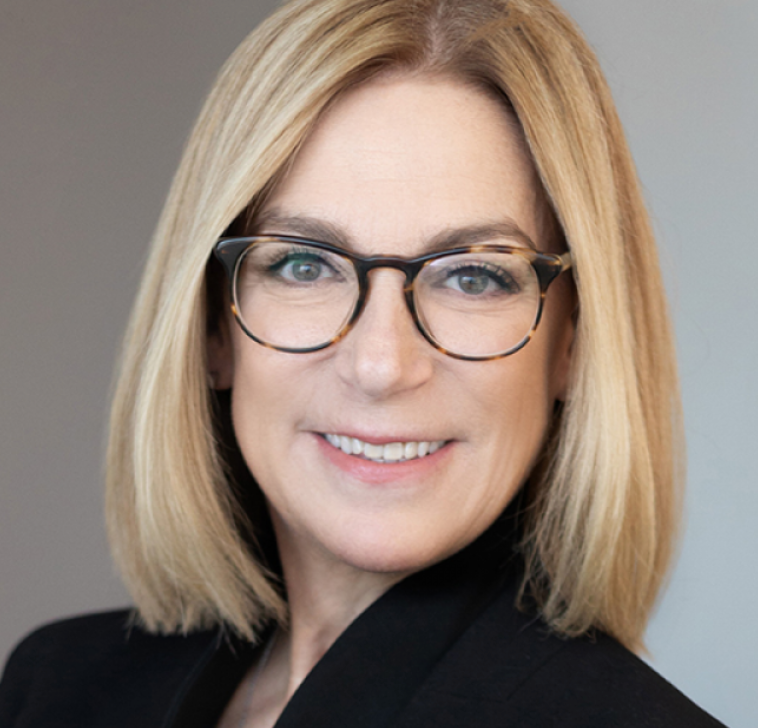
Carole Laible: The Rewards of Mentorship Recently, our CEO, Carole Laible, wrote about the wonderful mentors that have supported her throughout her career—and how important it is to give back by building relationships with those who are looking for guidance.
Read more at domini.com/mentor
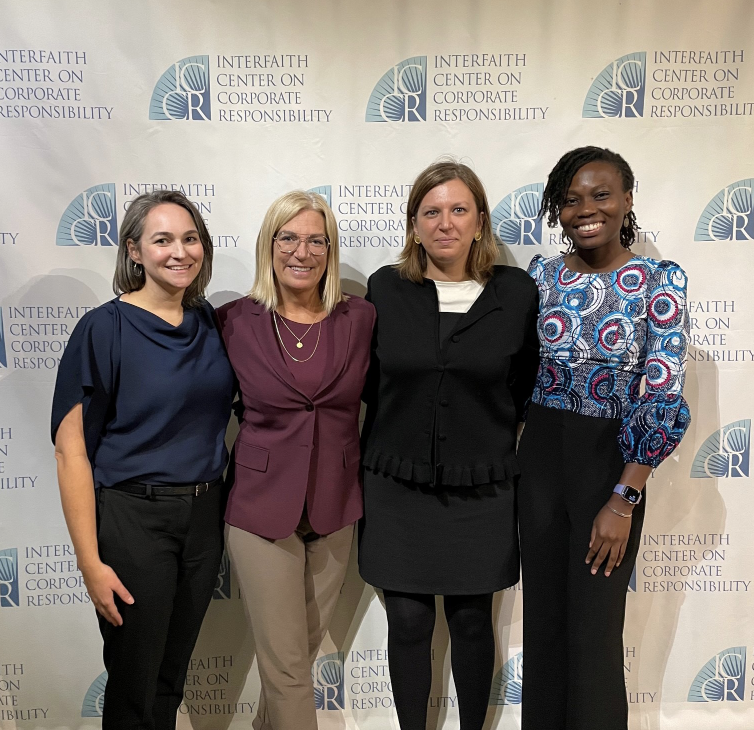
An Evening with ICCR We thoroughly enjoyed joining one of our longtime partners, the Interfaith Center on Corporate Responsibility, ICCR, for its recent Good Company special event. The gathering was an opportunity to celebrate achievements in corporate responsibility and further the conversation on the role of companies in a just society.
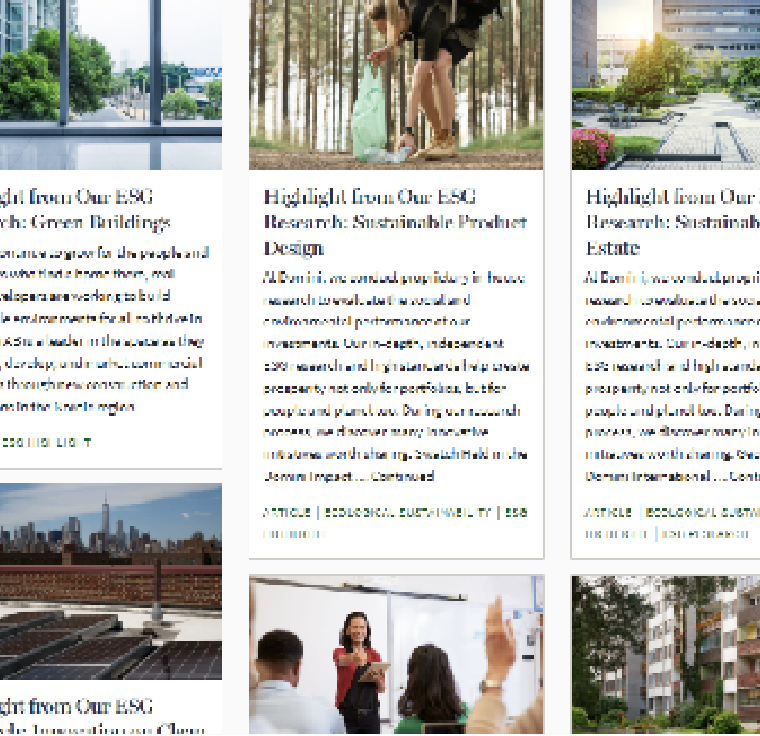
ESG Highlights—All in One Place We invest in companies that are striving to help create a better future. Our ESG Highlights, which you can read on our website, offer a quick look at some of the sustainable innovations being made by companies working on clean energy, inclusive finance, and much more.
Read more at domini.com/highlights
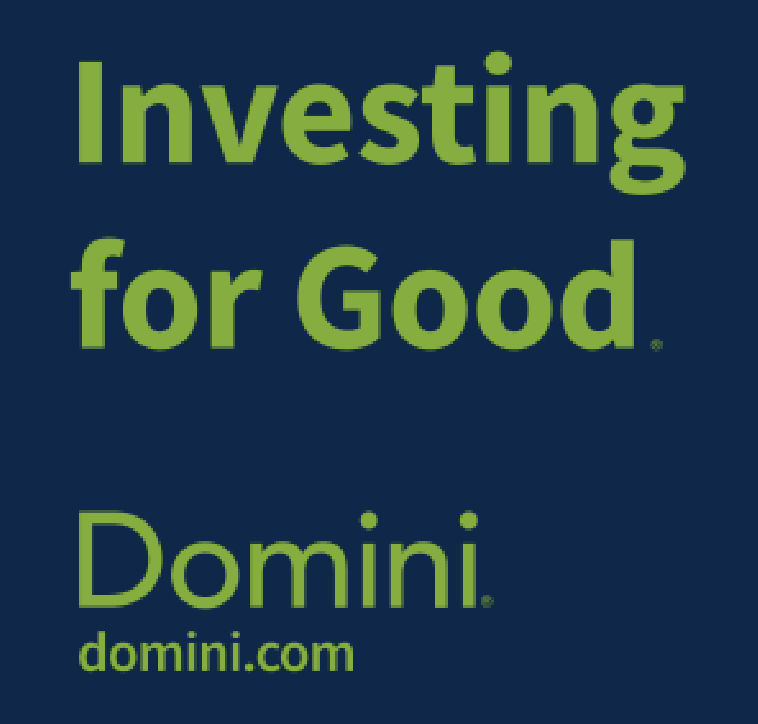
Domini on the road Domini is excited to be back on
the in-person conference circuit. Next, we’ll be in:
- San Francisco, for SOCAP22 on October 17-20
- Nashville, for the 2022 Money Management Institute Annual Conference on October 19-21
- New York City, for Reuter’s ESG Investment North America 2022 on November 1-2
- New York City, for the Women Adviser Summit 2022 on November 16

The secret to making an impact is small.
It starts by subscribing to news and updates.
